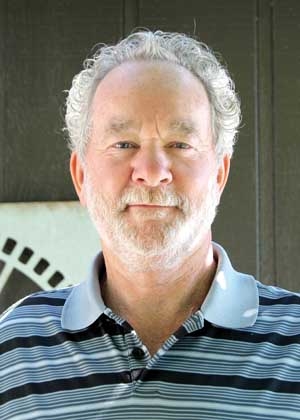
Darrell Collins
When Darrell Collins retired as a packing house owner, he found himself a new vocation.
Each weekday morning for the past ten years, he’s gone to Vale Elementary School in Cashmere, Washington, to help tutor first grade Hispanic children in English as a Second Language (ESL).
Collins was owner of Collins Fruit Company in Monitor, which in the late 1990s merged into his wife’s family business, Bardin Fruit Company, also at Monitor.
In 2005, the couple had the opportunity to sell the combined operation to McDougall and Sons in Wenatchee. Collins found himself retired at the age of 59, earlier than he’d expected.
Volunteering at Vale Elementary School fulfilled two of his goals.
First, it was a way to pay back the community of Cashmere, where he grew up.
“And I also wanted to help the Hispanic community, because I’d been working with them for almost 30 years,” he said. “Though it’s not a direct payback, because I might be helping the grandchildren or nieces or nephews of people who worked for me.”
Until the late 1970s, Collins and his father-in-law, Doc Bardin, relied on local people or Canadian Indians to work in the orchards.
Then, two or three people from Mexico showed up asking for work. They didn’t speak English and Collins didn’t speak Spanish, but they got by with gesturing and demonstrating how to do the job.
Those first workers told their friends and relatives about the job opportunities, and eventually the whole workforce was Hispanic. Some of the original employees, who have been there for 35 to 40 years, still work for McDougall.
As he hired more Hispanic workers, Collins felt he needed to learn Spanish so he could better understand their language and culture. He took three courses at Wenatchee Valley College, where he learned the grammar. He then went to Mexico for a month to immerse himself in Spanish. He took classes all day and lived with a family that spoke no English.
He and his wife, Janet, frequently visit Mexico, avoiding the tourist resorts. They like to stay in small fishing villages where people don’t speak English and they can enjoy the Mexican culture.
At first, Collins was afraid of saying something wrong when he spoke Spanish, but eventually he became more confident and found that his employees appreciated his efforts.
“They don’t care if you don’t say everything correctly,” he said. “What they care about is you’re trying to learn their language. I just feel it was a good thing to do. I think they had more respect for me.”
As no one in the office at Bardin Farms spoke Spanish, Collins became the liaison between the workers and the office staff. He made sure he treated the workers fairly and honestly.
“If there were any problems, especially with some that could not speak English, I was the one that helped,” he recalled.
When he sold the business to McDougall, he kept a 50-acre apple and pear orchard and also leases another 20 acres. But his priority each morning is to spend two hours volunteering at the elementary school.
“I do it because I like it, and it’s rewarding,” he said. “It’s a good, positive way to start my day.”
In some Hispanic families, the parents speak only Spanish and so the children pick up English from their friends. In class, they learn to read and write, and they set a goal of reading a hundred beginner books during the year.
At the end of the last school year in June, Collins received the Friend of the Young Child Award from the Wacoka Kiwanis Club of Cashmere in recognition of his work with the ESL students.
Kiwanis member Gloria Reichmann said the award is given to people who have gone out of their way to help young children. They tried to give Collins the award before, but he declined. “He’s just a modest person,” she said. •






Leave A Comment